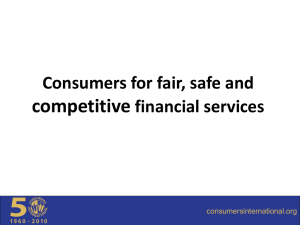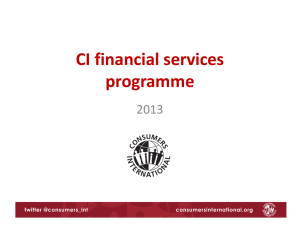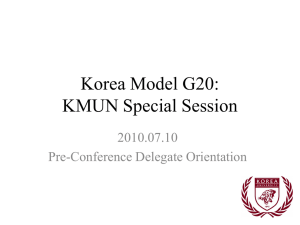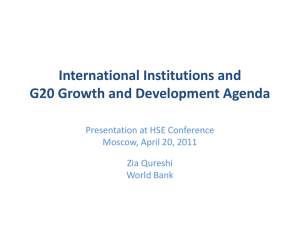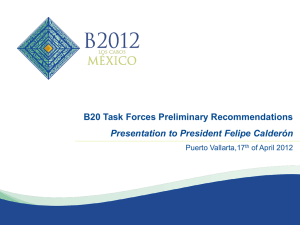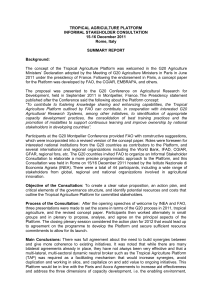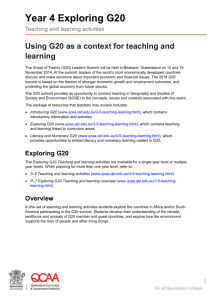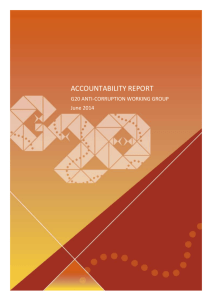A Renewed G20 Agriculture, Food Security and Nutrition Agenda in
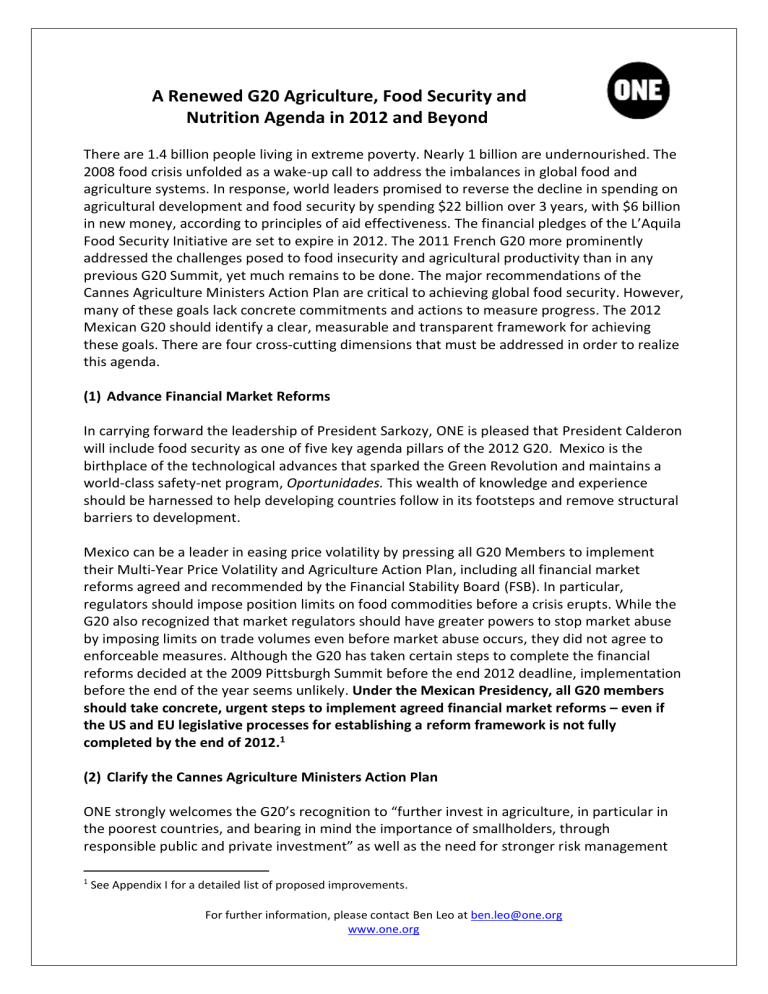
A Renewed G20 Agriculture, Food Security and
Nutrition Agenda in 2012 and Beyond
There are 1.4 billion people living in extreme poverty. Nearly 1 billion are undernourished. The
2008 food crisis unfolded as a wake-up call to address the imbalances in global food and agriculture systems. In response, world leaders promised to reverse the decline in spending on agricultural development and food security by spending $22 billion over 3 years, with $6 billion in new money, according to principles of aid effectiveness. The financial pledges of the L’Aquila
Food Security Initiative are set to expire in 2012. The 2011 French G20 more prominently addressed the challenges posed to food insecurity and agricultural productivity than in any previous G20 Summit, yet much remains to be done. The major recommendations of the
Cannes Agriculture Ministers Action Plan are critical to achieving global food security. However, many of these goals lack concrete commitments and actions to measure progress. The 2012
Mexican G20 should identify a clear, measurable and transparent framework for achieving these goals. There are four cross-cutting dimensions that must be addressed in order to realize this agenda.
(1) Advance Financial Market Reforms
In carrying forward the leadership of President Sarkozy, ONE is pleased that President Calderon will include food security as one of five key agenda pillars of the 2012 G20. Mexico is the birthplace of the technological advances that sparked the Green Revolution and maintains a world-class safety-net program, Oportunidades. This wealth of knowledge and experience should be harnessed to help developing countries follow in its footsteps and remove structural barriers to development.
Mexico can be a leader in easing price volatility by pressing all G20 Members to implement their Multi-Year Price Volatility and Agriculture Action Plan, including all financial market reforms agreed and recommended by the Financial Stability Board (FSB). In particular, regulators should impose position limits on food commodities before a crisis erupts. While the
G20 also recognized that market regulators should have greater powers to stop market abuse by imposing limits on trade volumes even before market abuse occurs, they did not agree to enforceable measures. Although the G20 has taken certain steps to complete the financial reforms decided at the 2009 Pittsburgh Summit before the end 2012 deadline, implementation before the end of the year seems unlikely. Under the Mexican Presidency, all G20 members should take concrete, urgent steps to implement agreed financial market reforms – even if the US and EU legislative processes for establishing a reform framework is not fully completed by the end of 2012.
1
(2) Clarify the Cannes Agriculture Ministers Action Plan
ONE strongly welcomes the G20’s recognition to “further invest in agriculture, in particular in the poorest countries, and bearing in mind the importance of smallholders, through responsible public and private investment” as well as the need for stronger risk management
1 See Appendix I for a detailed list of proposed improvements.
For further information, please contact Ben Leo at ben.leo@one.org
www.one.org
tools for vulnerable groups. Implementation of the five major G20 Cannes Agriculture Ministers
Action Plan recommendations will be critical for achieving global food security.
2 However, many of these goals lack concrete commitments and actions for measuring progress. The 2012
Mexican G20 should identify a clear, measurable and transparent framework for achieving
the Agriculture Ministers Action Plan recommendations.
(3) Align agriculture commitments with the new L’Aquila Food Security Initiative
The L’Aquila Food Security Initiative (AFSI) was spearheaded by US President Obama and agreed in 2009 as a three-year framework. When the US hosts the Chicago G8 Summit, there would be no more fitting time for the US to work with G8 members and other leaders to agree to an improved L’Aquila Framework. This framework should build on the existing commitments as well as expand to include emerging donors (including innovative triangular partnerships), greater transparency and accountability, and financial commitments at least through 2015. In particular, donors and all partners must build a results-oriented framework that more clearly and measurably identifies how they will achieve these goals through better monitoring, more strategic coordination, and stronger partnerships. As the 2011 G20 Communiqué mirrors many of the L’Aquila goals, the G20 should align its commitments with those of the AFSI and
make concrete commitments to technical cooperation with least developed countries.
(4) Galvanize Sustainable Private Investment in Agriculture
The private sector is a key component needed to drive agricultural growth, create food and agricultural supply markets, crowd-in rural infrastructure, and improve food and nutrition security. Investments are needed for developing seeds for vulnerable, changing climates, promoting appropriate use of fertilizers, spreading effective farming practices, and improving storage, processing, distribution, and marketing channels. In a time of constrained budgets, more must be done to unlock potential financing sources. Specifically, the Mexico G20 should
commit to:
Mobilize new privately-managed investments funds that specialize in, and span across, the entire agriculture sector such as the African Development Bank’s AgVance Africa proposal.
Deliver advanced market commitments (AMCs) currently under consideration and increasing loan guarantee vehicles as a way to jumpstart new agricultural innovations.
Support policy and regulatory reforms that improve the business climate while safeguarding the land rights of small-scale farmers,
Expand and improve infrastructure for transportation, telecommunications, energy, and water.
Adopt the FAO Voluntary Guidelines on the Responsible Governance of Tenure of Land,
Fisheries and Forests in the Context of National Food Security.
2 These include: (1) increasing agricultural production and productivity; (2) increasing market information and transparency; (3) reducing the impacts of price volatility; (4) improving global policy coordination; and (5) improving agricultural commodity markets.
For further information, please contact Ben Leo at ben.leo@one.org
www.one.org
Appendix I
ONE’s G20 Agriculture Asks
Goals and Objectives
The G20 must adopt clear, measurable, and transparent commitments with widely accepted criteria for monitoring and evaluating the G20 Agriculture Ministers Action Plan adopted in
Cannes.
Clarify the G20 Agriculture and Food Security Commitments
1) Increase Agricultural Production and Productivity
Financing for Agriculture
Adopt the new, improved food security initiative forthcoming from the G8 with clear, measurable and transparent commitments for funding, technical assistance, technology transfer, and triangular cooperation.
Require the immediate fulfilment of existing pledges to the Global Agriculture and Food
Security Program (GAFSP) and encourage new and emerging donor contributions.
Agricultural Research
Identify measurable, time-bound, actions for “strengthening agricultural research” in developing countries that includes financing, technical assistance, triangular cooperation, and knowledge transfer.
Require that the CGIAR research centers develop an action plan for investing in key crops and those most suitable for developing countries’ climate constraints, such as legumes.
Clarify the term “support” for the International Research Initiative for Wheat
Improvement with identified donors, financial and in-kind contributions, and a clear timeframe for action.
Agree to hold annual conferences on Agricultural Research for Development with an explicit mandate to address orphan crops and semi-arid, arid and tropical climates.
Policy Coherence
Require that the Joint Action Plan on Water, Food and Agriculture include: assigned roles and responsibilities for individual countries and organizations; clear and consistent time frame for completing these actions; public platform information on progress; and widely accepted criteria for measurement and evaluation of progress.
Clarify how G20 members will “foster smallholder sensitive investments in agriculture and explore opportunities for market inclusion and empowerment of small producers in value chains,” in alignment with the L’Aquila Food Security Initiative and the Rome
Principles.
2) Increase Market Information and Transparency;
As agreed at the 2009 G20 summit in Pittsburgh, G20 members must swiftly undertake the necessary legislative steps to:
For further information, please contact Ben Leo at ben.leo@one.org
www.one.org
i.
Trade all standardised over-the-counter derivative contracts on exchanges or electronic trading platforms (where appropriate); ii.
Clear all standardised over-the-counter derivative contracts through central counterparties by the end of 2012 at the latest; iii.
Report over-the-counter derivative contracts to trade repositories; and iv.
Subject non-centrally cleared contracts to higher capital requirements.
Require all G20 Members to work with the FAO to secure funding for operating the
Agricultural Market Information System, develop a transparent system for the timely provision of consistent data information, and a rapid timeframe for integrating all grain producers and consumers into the system.
Require all G20 Members to legislate that market regulators should have greater powers to stop market abuse by imposing limits on trade volumes even before market abuse occurs.
3) Reduce the Impacts of Price Volatility on the Most Vulnerable through the Development of Appropriate Risk Management Instruments;
Identify how “support” for risk-management instruments will be provided through clear, time-bound, and measurable actions.
Ensure the Agricultural Price Risk-Management product developed by the IFC serves the needs of poor producers in poor countries, particularly those without access to an active commodity exchange and seek alternative measures to better suit the needs of these producers in the short- to medium-term.
Encourage private sector actors to create an open and transparent process for continuing a multi-stakeholder dialogue and partnership on risk management for food security and agricultural development, with a view to developing pilot projects in response to requests from vulnerable countries.
4) Improve Global Policy Coordination
Identify how the G20 will improve efforts to scale-up nutrition interventions and the incorporation of nutrition in all relevant policies through clear, time-bound and measurable actions, particularly as it relates to carrying-out the Action Plan on Food
Price Volatility and Agriculture.
Endorse the “Voluntary Guidelines for Responsible Governance of Tenure of Land,
Fisheries and Forests” once adopted by the Committee on World Food Security with a view to implementing the guidelines within each G20 Member country and encourage the implementation in all developing countries.
5) Improve Agricultural Commodity Markets
Develop a concrete, time-bound and measurable plan for supporting the establishment of, and greater access to, commodity exchange markets in developing countries.
Ensure compliance with the agreement to remove current and avoid future food export restrictions or extraordinary taxes for food purchased for non-commercial humanitarian purposes by the World Food Program in parallel to rather than as part of a new WTO
Agreement on Agriculture.
For further information, please contact Ben Leo at ben.leo@one.org
www.one.org
